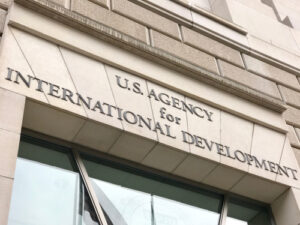
U.S. Reps. Brian Fitzpatrick (R-PA) and María Elvira Salazar (R-FL) on Nov. 15 introduced a bipartisan bill that would elevate the role of the United States Agency for International Development (USAID) in global health research and development.
“The United States must remain a leader in health technology innovation at home and abroad,” Rep. Fitzpatrick said. “Our bipartisan bill aims to address global health issues and provide further research and development in order to help save millions of lives on the world stage.”
The Supporting Innovative Global Health Technologies (SIGHT) Act of 2023, H.R. 6424, which Rep. Fitzpatrick sponsored alongside original cosponsors Rep. Salazar and U.S. Rep. Chrissy Houlahan (D-PA), would provide additional authorities for USAID to become the leader in health technology innovation for global health in low-resource settings, according to the congressional record bill summary.
“We need stronger American investments to tackle the global health challenges of the 21st century,” said Rep. Salazar. “The SIGHT Act establishes a program dedicated to research at USAID, allowing us to better focus our energy on transformative tools that can save lives and drive down costs.”
According to the text of the bill, it is in the national interest of the United States to build greater country capacity for R&D of new health technologies in low and middle-income countries, where human immunodeficiency virus, tuberculosis, malaria, neglected tropical diseases, emerging infectious diseases, and many other health conditions, such as complications in pregnancy, “have a disproportionate public health burden.”
And while the need for new tools to tackle such disease threats has grown, investments by the USAID in R&D have shrunk in recent years as a proportion of its overall global health spending, squeezed by both stagnant budgets and growing needs.
“Innovation at the USAID is primarily supported from siloed disease- and population-specific appropriations accounts, resulting in the limitation of its ability to seek shared value across health sectors or health threats,” says the text.
Under H.R. 6424, a single, separate budget line would be established not later than 90 days after the date of the bill’s enactment for expanded R&D activities via a competitive grant program, the bill says.
H.R. 6424 has been endorsed by 50 entities, including the Global Health Technologies Coalition, the Task Force for Global Health, the Pandemic Action Network, the Coalition for Health Research and Development, and the American Academy of Pediatrics, among many others.
“COVID-19 laid bare that we must ensure populations at home and abroad have the resources to innovate rapidly, and that global health directly impacts economic stability and prosperity,” Rep. Houlahan said. “As health emergencies continue to affect communities worldwide, it’s important that we invest in organizations with a track record of successfully advancing global health. One great example is USAID.”



